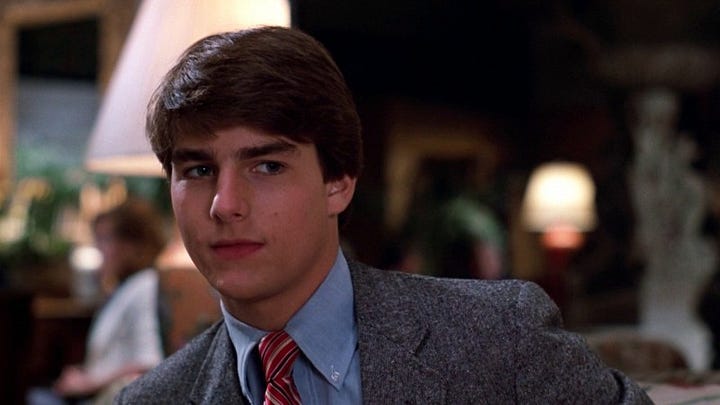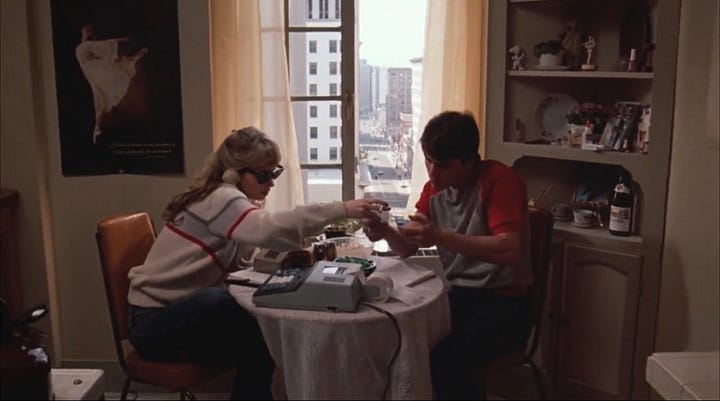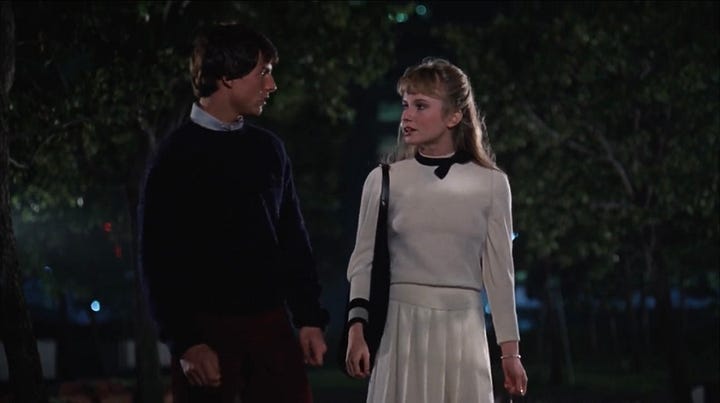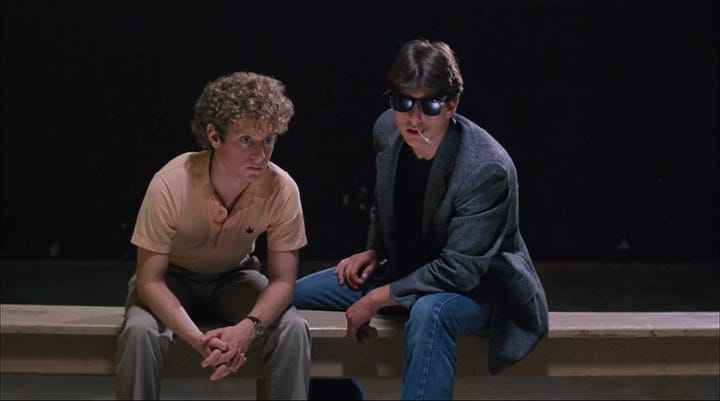“Hey, ‘Mr. What The Fuck’ … What about exploring the dark side and all that? Or was that just bullshit?”
"That was just bullshit, Joel. I'm surprised you listened to me." [Risky Business, 1983]




Risky Business (1983) is a teen movie. It's a sex movie. It's a comedy. It’s none of those things. It's a biting satirical commentary on the creeping societal rot of Reaganism. Of who gets second, third, fourth chances and who doesn’t even get their first. Of how we’re all stuck in a system we’re beholden to, no matter the opportunities we think we have. It's like if Michael Mann directed Ferris Bueller's Day Off. It’s stylish and sharp, oozing a slick sex appeal that pulses with a score by Tangerine Dream and a soundtrack that features Talking Heads, Bruce Springsteen, Police, Prince, and the first use of Phil Collins’ “In The Air Tonight” on screen. It was almost never made. It was almost never released. It changed the trajectory of American culture and our soft power in the world. Before John Hughes lit his sixteen candles and assembled the breakfast club, there was Risky Business.
Beyond its status as one of the first great teen movies—it was beloved by critics and audiences alike, going on to make 10x its budget—Risky Business was a cultural juggernaut. Before we had the concept of “memes,” Risky managed to create one. The film contains a scene that has gone on to transcend the film itself, becoming one of the most famous and parodied scenes in the last 40 years of cinema, and maybe of all time. When young Joel Goodson slides into frame—in front of a staircase, wearing nothing but a pink button-up, tube socks, and his underwear, and lip syncs to Bob Seger's “Old Time Rock n Roll” while dancing around his living room—he created a touchstone that remains embedded in pop culture. The scene was a favorite of early MTV, as constant in the rotation of music videos played in living rooms around the U.S. as the likes of Michael Jackson and Madonna, parodied endlessly by other films, TV shows, music videos, and advertisements. By Ronald Reagan Jr. on SNL in 1986 and again by Nicole Kidman on the same program in 1992. It’s been used in a slurry of ad campaigns, from Guitar Hero’s big launch push to Domino’s Delivery Business ad campaign in 2020. Even The Simpsons had Homer rocking out in his socks and underwear to Bob Seger. If you’ve ever danced around an empty house in your socks to blasting music, trying to look cool for some imaginary camera, you have Risky Business to thank.
But its most famous scene is, out of context of the progression of the plot, almost tonally dissonant with the rest of the film. Risky Business is technically a teen sex comedy, but it doesn’t feel that way when you watch--it feels like watching something else, something more. Risky Business opens with Joel Goodson, a good-looking if guileless upper middle class high school senior in the North Shore suburbs of Chicago with aspirations of going to Princeton, taking his parents to the airport as they leave him home alone for a week. It ends with Joel having bought back the entire contents of his house from Guido the Killer Pimp using the money Joel made turning his house into a brothel, with the assistance of his maybe-girlfriend and definite-sex-worker Lana (played beautifully by a young Rebecca DeMornay) for the weekend to make enough money to fix his dad’s Porsche (which crashed into Lake Michigan) and a few thousand dollars to spare, just before his parents return.
Risky Business, by all metrics, should have aged terribly. The gender and sexuality politics of the 80s should have rendered the movie completely unwatchable by the standards of 2023—Joel’s friends hire Jackie, a Black trans woman sex worker, for Joel to “let off some steam”, for goodness’ sake—and yet, Jackie is always treated with dignity and respect by both Joel and the movie itself. The joke always remains on Joel for being too much of “a white boy off the lake” to take advantage of Jackie’s services. As a modern audience member, when watching movies that deal in subjects that are still difficult to navigate in media, there’s a constant breath-holding, waiting for the other shoe to drop, wondering how much we will have to write off as “a product of its time” but, somehow, Risky manages to keep its plates in the air, with every moment of distaste intentionally included by the filmmakers to emphasize the darkness of the satire they created, rather than an unintentional gaff brought on by the passage of time.
There’s nuance to every conversation, to every glance between Joel and Lana, as the film both entices with the seductive nature of Reaganism and constantly reminds the audience of the power dynamics at play without being aggressive. In the quiet spaces where the score is allowed to breathe, when Joel furiously bikes to Lana’s apartment or they clear out a late-night L train, Risky reveals itself as something more than its contemporaries. It asks the audience to question who is using whom and if the usage versus the reward are worth the cost of the exchanges at play. It questions the nature of attraction, of love, in the face of profit and greed. Do Joel and Lana actually care for each other, or are they merely using the other as long as it remains mutually convenient and beneficial? Does it matter, or is it enough that they’re together, making love on a real train?
All that isn’t to say Risky is a perfect film or that it hasn’t aged a day, but rather that when talking about the film being a product of its time, you do so with a sense that it was trying to say something real, to push boundaries as much as a studio comedy could, and any missteps along the way weren’t malicious or due to a lack of care, but because what was presented were merely just the way things were in the early 1980s.
While the film has earned its rightful place in pop culture history, the sad truth is that, despite its significantly darker themes and seductive satire, Risky Business is not remembered as anything more than another 80s teen sex comedy—albeit one that has aged better than most of its contemporaries (the racial and sexual politics present in Sixteen Candles don’t feel like a charming product of their time, but rather an uncomfortable reminder of what the past not only allowed but found funny). The film’s clear influence on the John Hughes movies that would come after it (a Chicagoan North Shore teen, riddled with anxiety over his future and success and pleasing his parents, wrecks a Porsche, anyone?) are noteworthy but the only people who care about that sort of thing already know about it. Most of the cast went on to have good careers (all of them are still working today) but most would never reach the height of Risky again. Writer-director Paul Brickman, a first-time director, let the bitterness over the fights in post-production with producer David Geffen and Warner Bros. sour him on Hollywood. Brickman wanted a different, darker ending for the movie than the one that made it into the final cut and after a long fight with the studio, he relented. His concession turned out to be almost for naught as WB decided that they still didn’t quite understand the movie and therefore wouldn’t be giving Risky Business a proper premiere, a real promotional tour, or open it any wider than a modest 700 screens. Despite the studio’s meddling and underselling, Risky made 10x its budget at the box office, but the brutal studio fights paired with sudden pressures of success affected Brickman, and he didn’t direct anything new for almost a decade after Risky’s release. In the intervening years, he still has only sporadically dabbled in Hollywood. Risky Business should have faded into obscurity when the MTV generation grew up and realized it was more difficult to show their kids an R-rated movie about sex work and the seductive dangers of capitalism than it was to show them one of John Hughes’ movies or Back to the Future.
And it would have. If not for its star.
'“Sometimes you gotta say ‘What the Fuck’, make your move. Joel, every now and then, saying ‘What the Fuck’, brings freedom. Freedom brings opportunity, opportunity makes your future.” [Risky Business, 1983]
When asked, Tom Cruise will tell anyone and everyone that he has wanted to make movies since he was four years old.
I believe him. But, despite his early passion for film and cinema and a clear desire to make movies one day, he didn’t become an actor through a carefully thought-out plan that he concocted and set in motion over years. Tom Cruise became an actor almost by chance. After years of dealing with his dad moving him and his three sisters every few months (he attended fourteen schools by the time he was a freshman in high school), his dad’s violent abuse, his parents’ divorce, living in poverty, his mom’s remarriage, and a final move to northern New Jersey, Tom Cruise was good at being the perpetual new kid. He knew he needed to join in extracurriculars to make up for the way his dyslexia made him struggle with school work. After a few misfires, he excelled with the wrestling team, making friends and putting down roots for the first time in his life.
Until he busted his knee his senior year of high school and found himself benched for the wrestling season.
With a suddenly open schedule, Tom was convinced, by friends and with the blessing of his wrestling coach, to audition for the school’s musical, Guys and Dolls. Despite never having acted professionally in his life, he was cast in the role of Nathan Detroit and was hooked. It must have been something to witness, someone so clearly born to do something come into that passion, because when he asked his mom and stepdad if he could skip his graduation and move to New York City to be an actor, they agreed.
In the summer of 1980, just shy of his 18th birthday, Tom Cruise moved to New York to be an actor. By the end of that year he would be cast in two movies, a small role in Franco Zeffirelli’s Endless Love and, after one of the leads didn’t work out, a starring role in Harold Becker’s TAPS. By the end of 1981, he was famous. Less than two years later, he was a household name.
“[Tom] Cruise in the mid-1980s wasn’t just a star; he was a supernova. […] Tom Cruise style was all about the message that you could fill your body with so much energy, charisma, and absolute coolness that your clothing took on those same sensibilities. Even a tank or a simple pocket tee was a fashion statement under this law. That’s how good he was.” [Taffy Brodesser-Akner, GQ.com, 2015]
Risky Business should not have been a hit. In his 2011 memoir Stories I Only Tell My Friends, Rob Lowe mentions that consensus among their friend group was that Cruise was taking a massive leap of faith in tying his name and future success to the picture. Circumstances outside of Cruise’s control—bad blood between the first-time director and the studio meant that it was under-promoted, under-released, and wasn’t even granted the courtesy of a proper premiere—should have spelled the picture’s doom, leaving it to flop and fade into obscurity. But, it had him. On the Ringer podcast The Rewatchables, co-host Sean Fennessey once described Tom Cruise as “a human tractor beam of charisma.” I have yet to find a better description of the power Cruise holds when he’s on camera. He’s simply mesmerizing. And, despite the film predating me by a good twelve years, I like to think the people of 1983 knew exactly what they were watching when they sat down in the theater to watch Risky Business that August. I like to think they knew they were witnessing a once in a lifetime event. A supernova. The Birth of a Movie Star.
Despite Cruise’s constant presence in my life, I managed to avoid watching Risky Business in full until my mid-20s. It was like a switch went off in my brain. I understood and accepted the allure and appeal of Cruise before watching Risky Business, but Cruise’s performance, so young and unpolished, was captivating to witness. He exudes a confidence, a depth, even at 19, that instantly makes it clear why he is who he is. The vulnerability, sexually and emotionally, he brings to Joel and the movie itself fascinated me. It’s so rare, even now, to watch a movie where a male lead allows himself to be clearly insecure about his sexuality and the pressures of success without taking it out negatively on women, always keeping the joke on himself. He expresses anxiety and uncertainty with such earnest depth that, for a moment, you think he might not be in on the joke of the satire. It’s incredible to behold in someone so young and inexperienced. And yet, for all his vulnerability, he exudes a constant, magnetic confidence that allows the audiences to trust him to carry this story.
In the 2022 film The Fabelmans, Steven Spielberg’s stand-in, Sammy, is confronted by Logan, a beautiful, antisemitic bully whom Sammy turned into the main character of their senior class beach day video, for making him look like a god:
“I made you look like you could fly,” Sammy cries.
“But I can’t,” Logan counters, shaken to his core by the otherworldly version of himself that was projected onto a massive screen in their high school’s gym.
As the local Cruiseologist, I’m often asked about star power, the It Factor, what it means and takes for someone to become a movie star beyond social media stans deciding that their new flavor of the month is one. The “Old Time Rock n Roll” sequence has gone on to transcend the movie itself and I have watched every parody and homage to it that I could get my hands on, searching for something but not sure what I was looking for, until I rewatched the original. In every imitation, there’s a split second where the person sliding into frame lets the fear of falling take over, and they shift their weight, breaking the smoothness of the glide. When Tom Cruise slides out into frame, there is no hesitation. He knows he’s going to hit his mark. He knows he won’t fall. He knows that, when he doesn’t fall, he will fly. He wants to fly. He wants to fly for us.
Tom Cruise has been a movie star, a household name, for forty years. He’s been one of the most famous people on the planet for thirty-seven of them. He’s gone through phases and changes and pivots over the decades as he, and Hollywood and the world, have changed. But he’s still there. He’s so omnipresent in culture, so ingrained into our collective psyche, that his existence and star power feels like innate knowledge. The sun rises in the east and sets in the west, Darth Vader is Luke’s father, and Tom Cruise is a movie star.
And yet, for all his omnipresence, Cruise remains an enigma. The most famous actor alive, possibly the biggest movie star to ever live, is somehow more unknowable now than he was when he slid into our lives in Risky Business. Cruise has so isolated himself from the average person that even now, forty years into being more famous than the human brain can comprehend, he still elicits a sense of awe, a constant wonder at what his deal is, even a wistful melancholy that we only get to experience him for so long. He slides in and out of our lives like a comet, briefly illuminating the world with the awesome power of superstardom, leaving so he may return again and remind us of why we made him who he is, why we crowned him a star.
“Newman, who played Cruise’s mentor in The Color of Money, considers the young actor’s competitors and says, ‘Tom may be the only survivor.’” [Playboy Magazine, 1989]
For all that Hollywood is a cutthroat industry, the movie star system is surprisingly democratic, if you think about it. Sure, to get the initial chance at success means wading through constant obstacles and gatekeepers, systemic discrimination and bigotry, but if you get that shot, if you can finally get the chance to show what you’re made of, all that matters is the audience. We decide who will get us to leave our houses and pay to sit in a theater just for the privilege of seeing them on a 30ft screen. We decide whose movies we want to own in our homes to watch over and over again. We either will pay to see you—not your director or your co-stars or the IP, You—or we won’t. In the end, the people choose their gods.
Stars come and go: some will always be stars but never shine as brightly as they once did, some reach for that peak of stardom but find themselves happier on another tier or as character actors, some never take off at all, and some are given chance after chance only for people to realize it’s been a decade of being told this person is “The Next Big Thing” and we’re still not totally sold on them outside of super recognizable IP that doesn’t need them to succeed. Stars come and go. Tom Cruise remains.
“Ask Cruise whether audiences see him as an actor or a movie star, and he says, after a long pause, in an almost inaudible whisper:
‘It doesn’t really matter to me.’
Talking to Cruise about what a big movie star he is is a little unseemly. It’s stating the obvious. Tell him that audiences go to his movies not so much to see his characters, but to see him, and his eyes narrow.
‘That’s a real honor,’ he says. ‘Some people will hook into a character or a story more, I don’t know … But actor-movie star … I just do it.’” [Premiere Magazine, 2005]
Tom Cruise was elected President of Movies. Paul Thomas Anderson said as much while promoting Magnolia in 1999. We can all debate on when those first election results came in: was it after Risky Business? Did we wait until Top Gun was a hit? Maybe when Rain Man became the highest grossing movie of 1988 and won Best Picture? Perhaps it was as late as the one-two punch of Mission: Impossible and Jerry Maguire? Whenever it was, it doesn’t change the position he holds and that he’s been in it for decades. Tom Cruise is President of Movies for exactly the reason why he doesn’t see it as an issue that people view him as a movie star first, actor second, person third (if at all): he’s here to entertain us. He doesn’t care about pleasing a specific audience; he just wants to entertain the audience, everyone and anyone who might decide to watch one of his movies, through any means possible (but, preferably in a theater). Back in the 1980s and 1990s, that meant interpersonal dramas and comedies. In the 2000s and 2010s, that meant blockbusters that increased in size and scope with each iteration. And now, as he enters his fifth decade of movie stardom, he’s still reaching for the best way to entertain us. In an interview on TikTok for the Mission: Impossible - Dead Reckoning, Part One press tour, Tom Cruise jokingly quoted his friends Russell Crowe and Ridley Scott (whom he worked with on The Mummy and Legend, respectively) and asked, arms outstretched, “Are you not entertained?” We are, Tom.
Tom Cruise deals in human fulfillment. He has spent the last forty years as a cultural icon. His movies have grossed roughly $12 billion at the global box office. He was the first movie star to have five films in a row gross more than $100 million at the domestic box office. There is a Tom Cruise Day every October 10th in Japan. Two of his films have won the Golden Bear. He has four Academy Award nominations, an Honorary Palme d’Or, and three (returned) Golden Globe Awards from eight nominations. That first Golden Globe nomination was for Best Performance by an Actor in a Motion Picture - Comedy or Musical for Risky Business.
Time of your life, huh kid?



amazing writing! you get it
Someone on Letterboxd said something to the effect of 'movies exist so Tom Cruise can make them' and honestly? They might just be right